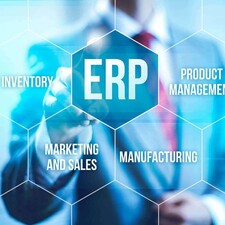Blog
Struggling With An Outdated ERP System?

Summary
What's Your Problem? Part 6
Outdated ERP system got you down? We have become so used to software in every aspect of our lives that there is a tendency to forget what we did before it became ubiquitous, especially in terms of how we work. The majority of us now use some sort of software in the workplace every day, often via ERP systems that are designed, at least in theroy, to make our jobs both easier and more efficient.
ERP software solutions are rarely static. Much like every other piece of technology, they continue to be tweaked and improved. So how can you tell if it's time for your legacy ERP system to get an upgrade?
Watching Out For Red Flags
A prudent company should be constantly looking out for various warning signs that its ERP software is no longer as productive as before.
If your ERP system doesn't have cloud and mobile functionality, you can be fairly certain that it is out of date
For example, the increased influence of the cloud in a workplace environment—and the corresponding use of mobile and web technologies—has not only impacted our work-life balance but also forced companies to take stock of what they currently have in place. According to an IDC report, the global managed cloud services market will grow significantly in the next four years, with spending on cloud solutions predicted to hit $62.8 billion by 2021. To put it in simple terms, you have an outdated ERP system if it doesn't have cloud and mobile functionality.
Companies and decision makers need to remember why they introduced ERP software solutions in the first place. Integrating all aspects of a company's business operations into a single database and user interface arguably makes life simpler for the all employees. Software that isn't current or requires work arounds. In addition, if only a few people know how the system really works—the nuts and bolts of the software itself—then the future can be in jeopardy.
Effective ERP Software Gives Room To Grow
And then there is the question of scalability.
An ERP system might be so outdated that it can't cope with rapid growth or increased functionality requirements. Companies might need to factor international expansion, business intelligence or a mobile workforce into the mix, maybe all three. Most legacy systems weren't built to deal with these basic elements of modern industrial businesses. One of the recurring problems that comes with an outdated ERP system is that software vendors can stop support for that system entirely. Companies are then left between a rock and a hard place: a system that doesn't work but with no way to fix it. When that happens, the most logical path to take is to invest in a modern ERP solution.
Partner with an ERP vendor that can provide you with software that is reliable, easy to use and constantly evolving
How can companies make sure that their next ERP system meets their needs in the long run? The answer is to partner with an ERP vendor that can provide them with software that is reliable, easy to use, and constantly evolving to meet the changing requirements of their particular industry. Long-term viability of an ERP system is as much about the vendor's vision for future development (and ability to carry the vision out) as it is about any particular feature or function of today's software.
For more information on how to recognize the signs that you have an outdated ERP system that needs to be replaced, check out our FAQ or What's Your Problem!? video series, download our guide to Selecting an ERP System in 7 Easy Steps, or contact us today.



